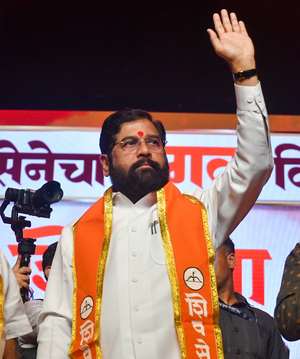Mumbai: Maharashtra Chief Minister Eknath Shinde will outline the state government’s plan to be a major contributor to the Centre’s ambitious Viksit Bharat 2047 mission especially with the implementation of a slew of initiatives in the fields of drinking water, electricity, health, schooling and land and property.
Shinde, who will attend the 9th Governing Council Meeting of NITI Aayog in Delhi on July 27, will also reiterate the state government’s resolve to make Maharashtra a $1 trillion economy from the present $500 billion economy.
On the drinking water front, the state government has taken a slew of steps to make available adequate and clean water to all households at all times and at all convenient places in rural and urban areas.
The government has completed 30 regional water supply schemes under the Mukhyamantri Rural Drinking Water Programme which has benefitted about 9.35 lakh people in 430 villages.
For the improvement in urban water supply and sewerage, the state government is focusing on achieving 100 per cent self-sufficiency in water supply by providing tap connections to all city households, rejuvenation of water resources and providing 100 per cent sewage treatment and sewage connections.
In the electricity sector, Maharashtra has a total installed electricity generation capacity of 38,217 MW through conventional and non-conventional sources as of March 31, 2024, of which the share of the private sector was 60.4 per cent and 34.5 per cent of the public sector.
The state-run MahaGenco has accorded approval for the installation and commissioning of projects for capacity addition at various thermal power stations. Capacity addition of 660 mw at Bhusawal is in progress and it will be completed by August this year. The process of acquiring statutory clearances is in progress for Koradi thermal power station with a capacity of 1,320 MW.
In renewable energy, the state ranks fifth after Gujarat, Rajasthan, Tamil Nadu and Karnataka in terms of installed capacity of 12,271 MW. The government is pursuing its ambitious target of installation of environment-friendly electricity generation projects of 17,385 MW.
As far as schooling is concerned, Shinde will present a slew of initiatives being implemented for transformational reforms in school education in the state.
Under the Samagra Shikha, the government is implementing Sarva Shiksha Abhigyan, Rashtriya Madhyamik Siksha Abhiyan and Teacher Education to ensure inclusive and equitable education from pre-school to higher secondary stage.
During 2022-23, the government has incurred an expenditure of Rs 1,543.43 crore and Rs 2,378.60 crore up to October 2023-24.
The government has established 328 model schools by spending Rs 183.64 crore with attractive school buildings, classrooms according to several students, separate and adequate toilets for boys and girls, drinking water facilities and hand wash stations, library and reading room, computer room, virtual classroom.
In the health sector, the state government has three-tier infrastructure comprising sub-centres, primary health centres and community health centres to provide comprehensive health services.
The state government is focusing on making its flagship health insurance scheme the Mahatma Jyotirao Phule Jan Arogya Yojana more effective. The scheme provides end-to-end cashless quality medical services for identified diseases through empanelled hospitals.
During 2022-23, the claim amount of Rs 1835.87 crore for the surgeries and treatments was paid to the empanelled hospitals. During 2023-24, the claim amount of Rs 1845.20 crore was paid.
In the case of land and property reforms, the state government has compiled all land/property-related records of ownership and encumbrances on one single
online portal. Issuance of the registered deed to the applicant on the same day as the day of registration is made mandatory. The government has launched an Online system for auto-trigger Mutation at land records offices, Municipal Corporations for property tax, Water bills and DisComs for Electricity.
Further, the government has implemented a Unique Property ID across the State for all land parcels (both urban and local) called ULPIN (Unique Land Parcel Identification Number). More than 307 urban local bodies are being onboarded to the integrated web-based portal of the Directorate of Municipal Administration.
(Sanjay Jog can be contacted at Sanjay.j@ians.in)
–IANS


Comments are closed.